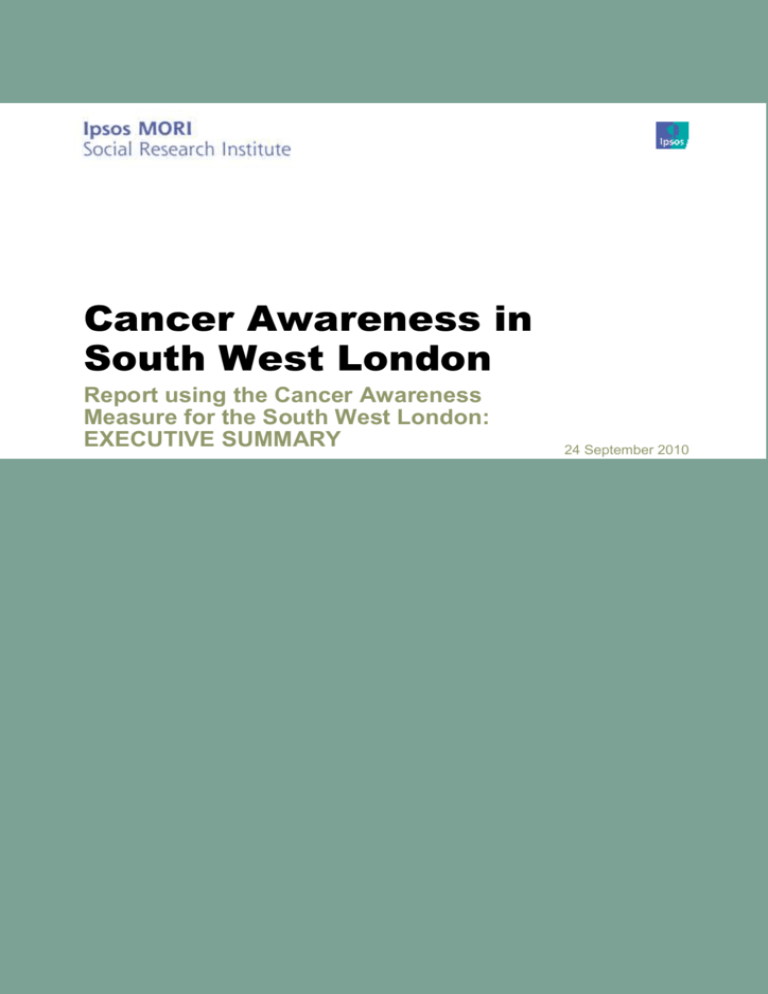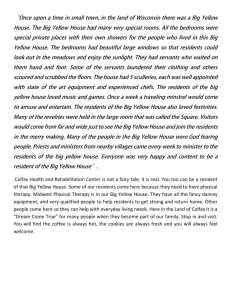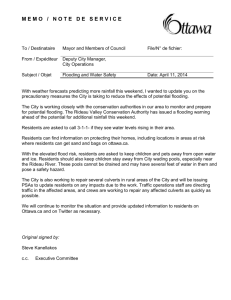
Cancer Awareness in
South West London
Report using the Cancer Awareness
Measure for the South West London:
EXECUTIVE SUMMARY
24 September 2010
Legal notice
© 2010 Ipsos MORI – all rights reserved.
The contents of this report constitute the sole and exclusive property of Ipsos MORI.
Ipsos MORI retains all right, title and interest, including without limitation copyright, in or to
any Ipsos MORI trademarks, technologies, methodologies, products, analyses, software
and know-how included or arising out of this report or used in connection with the
preparation of this report. No license under any copyright is hereby granted or implied.
The contents of this report are of a commercially sensitive and confidential nature and
intended solely for the review and consideration of the person or entity to which it is
addressed. No other use is permitted and the addressee undertakes not to disclose all or
part of this report to any third party (including but not limited, where applicable, pursuant to
the Freedom of Information Act 2000) without the prior written consent of the Company
Secretary of Ipsos MORI.
Executive Summary
This executive summary presents the findings of a research study conducted by Ipsos MORI
Social Research Institute measuring cancer awareness amongst residents of South West
London. The survey was carried out on behalf of the South West London Cancer Network
and a total of 5,009 interviews were conducted across the six boroughs that make up the
SWLCN region. Where appropriate, comparisons are made to the ONS National Cancer
Awareness Measurement Survey to provide benchmarks for the findings.
The impact of cancer
The majority of South West London residents report having been affected by cancer in some
way, either personally or through friends or family having the disease. One in ten residents
(12%) has personally had cancer themselves. Specific groups of residents – particularly
women, white residents, those aged 45-54 and those from social grades AB – are particularly
more likely to have been affected by cancer.
Around a quarter of residents (26%) are able to correctly estimate the proportion of people
who are likely to develop cancer at some point in their lives1.This is similar to residents
across the country as a whole, but a greater proportion in South West London tend to
underestimate its impact; this may be linked to slightly lower levels of incidence in the area.
Warning signs of cancer
Residents mention a range of possible warning signs and symptoms of cancer, the most
commonly mentioned of which is an unusual lump or swelling (59%). However, the depth of
residents’ awareness appears to be quite shallow, with only a relatively small proportion able
to identify more than five signs of symptoms of cancer (13%). While prompted awareness of
symptoms is significantly higher than unprompted, South West London residents appear to
have lower levels of awareness than residents elsewhere in the country.
It would appear that there is a strong link between personal experience of cancer and levels
of awareness. Those groups of residents who are less likely to have had personal
experience of cancer are also less likely to correctly identify its warning signs and symptoms.
These residents include those from ethnic minorities, those from social grades DE and those
1
30-36 people in 100
2
© 2010 Ipsos MORI.
aged 18-24. However, residents over the age of 65 are also less aware of the warning signs,
despite the fact that they have a relatively high incidence of cancer.
While knowledge and awareness of the symptoms is the first stage in the path towards
treatment, it ultimately means little if the recognised symptoms are not presented to a
medical professional in a timely fashion. The majority of residents would report most of the
symptoms asked about within a couple of weeks; the exception to this would be unexplained
weight loss. While South West London residents are slightly less likely than residents across
the country as a whole to report the individual symptoms, when asked specifically about
reporting a symptom that they thought might be cancer, the gap was much narrower.
Interestingly, residents who are more likely to present their symptoms early are in fact those
who have lower levels of cancer awareness and less personal experience of cancer (DE
residents, those form ethnic minorities and younger residents). This highlights that
awareness is not a barrier to presentation for all; there are other important factors that are
influencing residents’ decisions about whether to present symptoms to a doctor.
Apart from a lack of awareness, residents cite practical or convenience issues, such as not
being able to get an appointment, being too busy or having too much to worry about as the
main barriers to going to see the doctor. This is especially the case for white residents and
those from social grades AB. For some residents, such as those from social grades DE and
ethnic minority residents, fear of the consultation or the outcome affects whether they would
put off going to see the doctor. For others, communication and a lack of confidence is
also seen as a potential barrier. This includes being worried about wasting the doctor’s time,
feeling their doctor is difficult to talk to, not feeling confident talking about their symptoms and
being embarrassed.
Awareness of the causes of cancer
South West London residents clearly believe that lifestyle makes the greatest contribution to
developing cancer in the UK, with around half (53%) ranking it as the most important factor.
Second comes genetic inheritance (29%), while South West London residents rank
environmental factors, ageing and chance as having lower levels of influence on occurrences
of cancer in the UK. This follows a similar pattern to that for residents across the country.
When asked about the actual causes of cancer, the factors highlighted by South West
London residents are largely consistent with the priority ranking. They are dominated by
avoidable lifestyle factors (especially smoking, 79%), followed by external factors such as
3
© 2010 Ipsos MORI.
genes and the environment. Few residents do not know or did not mention any factors that
affect a person’s chance of getting cancer (five per cent combined).
There are key differences by sub-group, with those who are more likely to be at risk of
developing cancer also the most likely to be aware of the causes of cancer, especially those
that have more relevance to them. Younger residents and white residents are more likely to
be aware of the lifestyle factors such as smoking and drinking alcohol, while those aged 65+
and those from ethnic minority backgrounds were more likely not to know. When prompted
with specific causes of cancer, report knowledge was significantly higher.
In almost identical results to residents across the country as a whole, South West London
residents clearly believe that breast cancer is the most common form of cancer among
women, with over four in five residents believing this to be true (82%). Few residents
highlight other cancers, with breast cancer ten times more likely to be mentioned than the
next most popular choice. In reality the three most common forms of cancer among women
in South West London are breast, colorectal (bowel) and lung cancer.
The results for common cancers among men are slightly more varied, with just under half
(48%) thinking that prostate cancer is the most common form, while a quarter of residents
(23%) believe that lung cancer is the most common, while one in ten residents (12%) think it
is testicular cancer. Only four per cent of residents say they do not know. The three most
common forms of cancer among men are prostate, lung and colorectal (bowel) cancer.
Cancer screening
The majority of South West London residents believe that there is an NHS breast cancer
screening programme and an NHS cervical cancer screening programme (78% for both),
although these figures are lower than for the country as a whole. In contrast, South West
London residents are actually more aware of the NHS bowel cancer screening programme
than residents across the county. Regardless, knowledge of this screening programme is
much lower than for the other programmes (31%). Awareness of the screening programmes
appears to be very much linked to personal experience of cancer and relevance (in terms of
gender and age).
Those residents who indicated they knew about the three NHS cancer screening
programmes were then asked the age that people are first invited for screening for that
programme. For breast cancer screening, three in ten residents (34%) provide the correct
answer of 50-53 years. For the cervical cancer screening programme women are first invited
for this at the age of 25, with one in five residents (22%) correctly reporting this age. For the
4
© 2010 Ipsos MORI.
bowel cancer screening programme over a third of residents (36%) answer correctly
(between 60-69); however only a slightly lower proportion of residents (32%) are more than
five years from the correct answer, while just over a quarter (27%) do not know.
5
© 2010 Ipsos MORI.







